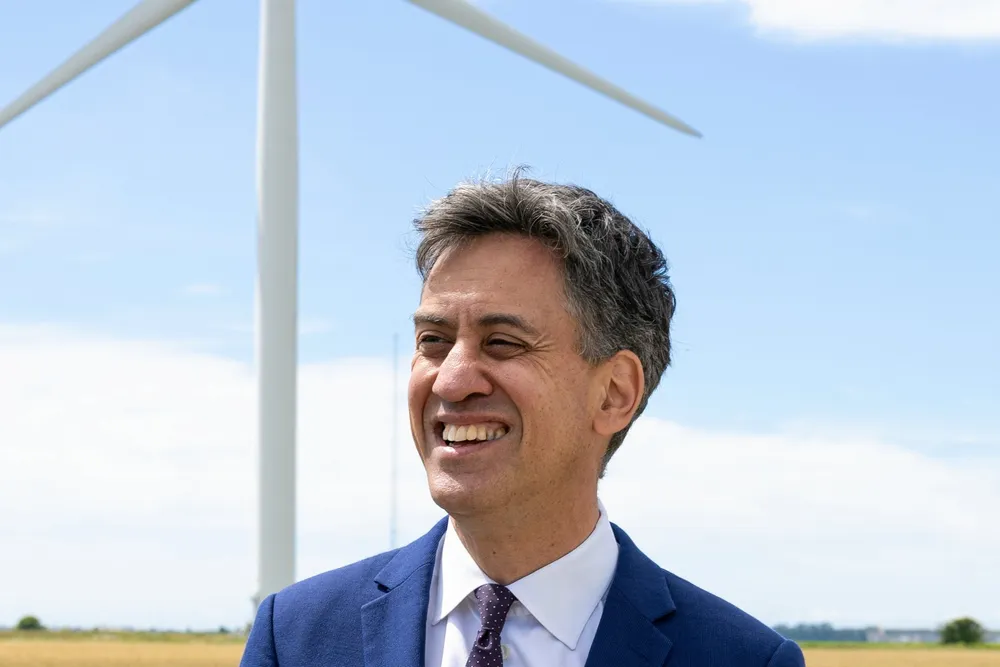UK says 'bring it on' as energy security summit reveals net zero battle lines
Energy secretary reckons public backing for green policies will see off opponents

The UK government is sure it will win the “battle” over its Net Zero policies despite growing pressure in the opposite direction from the US government and opponents at home, participants at a high-level summit on energy security heard on Friday.
A two-day summit on the Future of Energy Security, organised by the International Energy Agency and hosted by UK energy secretary Ed Miliband, was attended by representatives of over 60 countries which was, according to the IEA’s executive director Fatih Birol, a powerful statement in itself.
“I am very happy that at a time when we see increasing fragmentation on the global stage, more than 60 governments attended this conference,” he said.
“I say this because, while countries agreed that we still have to pay the utmost attention to traditional energy security risks, such as oil and gas, there are now emerging energy security risks of critical minerals and supply chains.”
These words were echoed by Miliband who stressed the spirit of cooperation that was discernible at the summit.
“We had many major renewable countries and renewable companies here, but we also had more than 10 net oil exporting countries here… and we had huge copper, lithium, nickel producers of countries. So, it was a big mix of countries and angles," he said.
“It was about building dialogue and cooperating and coming together to work on shared solutions,” he said, referring to the first convening of a new supply chain-focused forum called the Global Clean Power Alliance and what he described as growing collaboration on clean energy generation, lessons about power grids and diversification of critical minerals.
“There's a huge amount of cooperation going on and there's massive value in this… countries at the closed session all emphasised the importance of this dialogue,” he claimed.
Miliband, who argues strongly that renewable sources offer the energy security that fossil fuels cannot, was asked by reporters if the UK’s position had been challenged by US officials attending the conference.
Miliband played down the differences between US and UK policy.
“Obviously, there are some differences, but there is also common ground. And part of our job as governments is to find common ground,” he said, citing both nations’ renewed interest in “building new nuclear" as part of their energy mix, as well as geothermal sources of energy.
“Part of our job is to find that common ground, to work together with the US on these issues... that's the kind of discussion we had at this conference," Miliband said.
When forced onto the defensive by reporters about opposition to the very concept of Net Zero policies, both at home and abroad, and the idea that critical minerals represent a geopolitical lever that is potentially as powerful as oil has been for the past century, Miliband was defiant.
“The critics will not shut up, I'm sure, but the critics need to know that if they want to fight about this, this government says, bring it on," he declared.
“Let's have the argument… between cheap, clean renewables that give you energy security, lower bills, the biggest economic opportunity of the 21st century against those who case is to stick with the expensive, insecure fossil fuels that gave us the cost of living crisis, which ruined family finances, which ruined public finances and business finances.
“So whether it is political parties or other forces that want to take on Net Zero and the clean energy transition, they need to know this government is not for bending or buckling. …And you know what? I think the British people are on our side on this," he said.
Critical minerals race up agenda
Birol acknowledged that access to critical minerals has become an increasingly important part of the debate on energy security.
The clean energy transition is moving fast, which means more demand for critical minerals.
“So demand will increase for copper, for lithium, for nickel and others. There are three issues there. The mining part, refining of the critical minerals and manufacturing the electric cars, solar panels and (wind turbines) of the transition," he said.
Birol said the risk of concentration was of equal concern whether it is critical minerals, nuclear fuels or oil or gas.
"Diversification is one of the golden rules of energy security, together with predictability and cooperation," he stated.
"So we are talking with countries, developing programs and using our community power in order to diversify the critical minerals and the clean energy supply chains."
Birol said the summit has highlighted a recurring theme "that countries are becoming more and more interconnected and interdependent".
The sentiments were echoed by Miliband, albeit with a greener twist
"Participants have demonstrated a simple truth that in a world of fragmentation, there is huge value in multilateralism, in countries working together for their own national interests," he stated.
"I think it's very striking to listen to so many of the participants and the way they emphasised the role of clean energy and the increasing role of clean energy in their energy systems."
(Copyright)